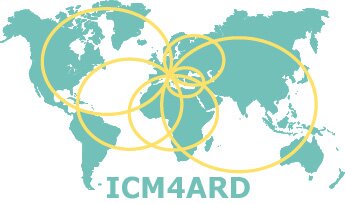|
Information and Communications Management for Agricultural Research and Development (ICM4ARD)
>> ICM4ARD in the Document Repository <<
 The Global Forum on Agricultural Research has been involved in building up a global information and communication system since its inception. At the GFAR Triennial Conferences at Dresden and Dakar, stakeholders expressed demand for a more equitable access to agricultural and related information. In response to this demand, and in partnership with the Regional Forums, under the GLOBAL.RAIS project, GFAR initiated a series of consultations in early 2003 with a wide variety of Agricultural Research and Development (ARD) stakeholders in the various regions and an Inter-Regional Workshop in Rome in 2004. The development of a global agenda for information and communications management for ARD was discussed during these consultations. This agenda seeks to improve the sharing and exchange of agricultural information and, in turn, strengthen agricultural research and innovation contributing to development. The Global Forum on Agricultural Research has been involved in building up a global information and communication system since its inception. At the GFAR Triennial Conferences at Dresden and Dakar, stakeholders expressed demand for a more equitable access to agricultural and related information. In response to this demand, and in partnership with the Regional Forums, under the GLOBAL.RAIS project, GFAR initiated a series of consultations in early 2003 with a wide variety of Agricultural Research and Development (ARD) stakeholders in the various regions and an Inter-Regional Workshop in Rome in 2004. The development of a global agenda for information and communications management for ARD was discussed during these consultations. This agenda seeks to improve the sharing and exchange of agricultural information and, in turn, strengthen agricultural research and innovation contributing to development.
Using the inputs from this process, GFAR has developed a proposal for a Global Partnership Programme on Information and Communications Management for Agricultural Research and Development (ICM4ARD). At a recently held expert consultation in October 2005 in Rome, jointly facilitated by CTA, CGIAR, FAO, GFAR and INASP, the main issues identified for intervention by the GLOBAL.RAIS consultations were endorsed by a wider participation of ARD stakeholders.
Four main issues have emerged from this dialogue: advocacy, capacity development, integration and governance.
A plan of action for each of these areas has been prepared and selected activities advanced.
Advocacy
This area addresses the need to strengthen the capacity of NARS leaders to advocate, articulate appropriate policies and strategies, attract more resources and greater investment for further development of ICT enabled National Agricultural Information Systems and lead further development of agricultural information systems.
Several activities have been initiated with GFAR's financial support from its own funds. These include: (i) setting up of functional task forces at sub-regional, regional and global organizations level to benchmark and regularly update the development of ICT enabled agricultural information systems, (ii) sensitization and awareness of ARD leaders and stakeholders on issues related to ICT use and ICM development, (iii) electronic bulletins on ICT use and ICM lessons learnt to achieve this output. Other activities, such as commissioning in depth success stories of ICT enabled information systems and ICM for ARD, await support.
Capacity development
Capacity development, in terms of infrastructure, institutions and human skills, among stakeholders to ARD is required to create, manage, share, exchange and use scientific and technical information, technology related information, research and research management information, extension, outreach and market information etc. for agricultural innovation and development.
With GFAR support, APAARI has already conducted 2 workshops for NARS ICT managers. AARINENA and FARA have planned workshops in 2005. Development of a toolkit for NAIS management will be initiated by AARINENA in 2006. Face-to-face workshops to develop and manage projects, institutions and experts and National Agricultural Information Systems-AGRIS information bases have been organized by FAO and are also planned in 2006. The undertaking of face-to-face workshops for ICT Systems Managers to develop and manage information systems and databases at a distributed level await consensus on mechanisms to achieve coherence. The recent expert consultation in Rome has paved the way to develop mechanisms to achieve greater coherence and integration of distributed systems. Following up on these activities now require financial support.
Integration
Greater integration of national, regional and global agricultural information systems and easier access to them, especially websites, through a GLOBAL.RAIS Web Ring and cohesive activities for improved management and more seamless sharing and exchange of information, experience and knowledge in agricultural information management through a Knowledge Network.
Knowledge network and creating the EGFAR Web Ring have undergone preliminary conceptual development through informal linkages of ICM managers of ARD Institutions who are key stakeholders of GFAR. This area also awaits technical and financial support.
Governance structures
There is a need to establish appropriate governance structures, such as task forces and steering committees, for global, regional and sub-regional AIS of GFAR, (AARINENA, APAARI, CACAARI, FARA, ASARECA, CORAF, SADC and FORAGRO) to promote and support more equitable access, sharing and exchange of agricultural information through ICT enabled Agricultural Information Systems.
Most regional and sub-regional organizations have or are rapidly setting in place appropriate governance structures for their information systems. The Caucuses and Central Asia (CAC) region remains weak. GFAR has planned to support regional organizations with special emphasis to the CAC The recent expert consultations held at Rome have already identified 3 task forces to be set up for advocacy, content management and capacity development. Operationalizing these task forces will require operational and financial support.
For further information please contact:
, GFAR Secretariat.

|




